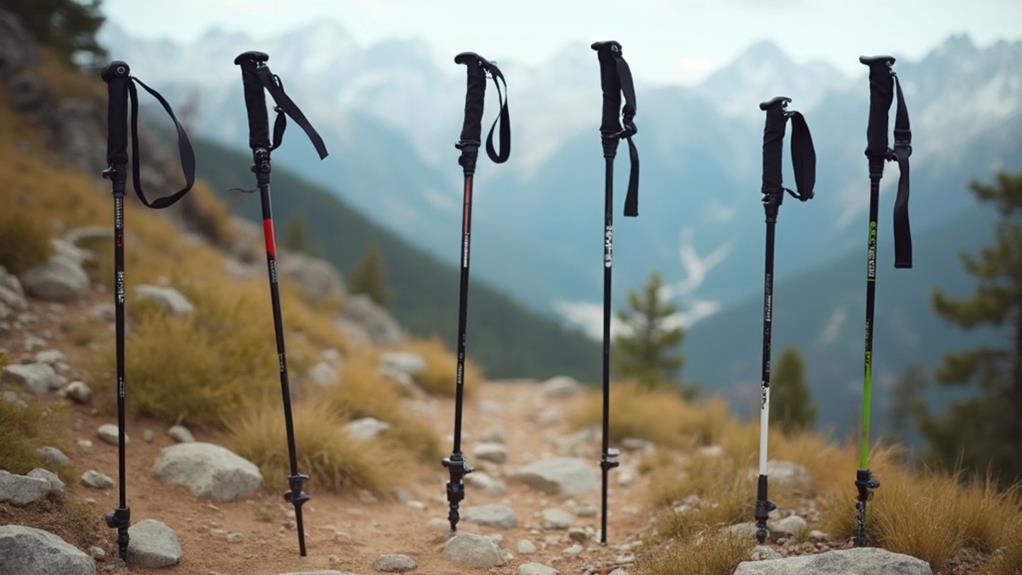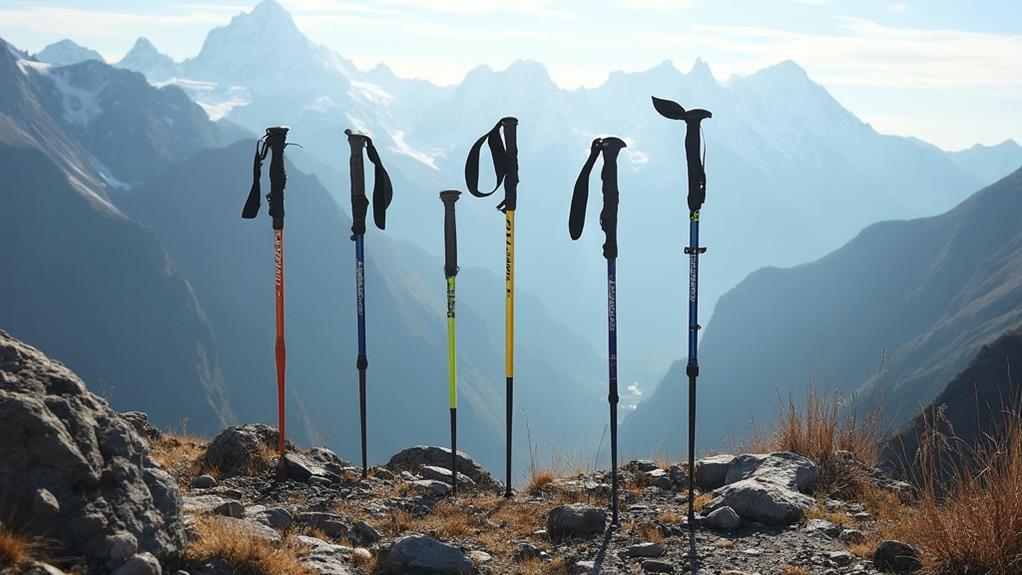The best hiking poles for advanced trails feature a balance of weight, durability, and adjustability. Top choices include Black Diamond Distance Carbon FLZ, known for its ultralight 18 oz build and practicality; Leki Legacy Lite, with robust aluminum and ergonomic cork grip; Black Diamond Alpine Carbon Cork, offering stability with a lever locking mechanism; REI Flash Carbon Compact, combining a carbon fiber structure with foam grips for added comfort; and Cascade Mountain Tech Poles, a lightweight, high adaptability option. For an in-depth exploration of these models' specific advantages and considerations specific to various terrains, further insights await.
Key Takeaways
- Black Diamond Distance Carbon FLZ offers ultralight design and collapsibility, ideal for portability on advanced trails.
- Leki Legacy Lite provides robust aluminum construction and ergonomic comfort, suitable for challenging ascents and descents.
- Black Diamond Alpine Carbon Cork ensures stability and comfort with lever locking and cork grip for steep trails.
- Cascade Mountain Tech Poles combine lightweight build with versatility, adapting to diverse terrains for advanced hikers.
- REI Flash Carbon Compact features durable carbon fiber and ergonomic foam grip, perfect for long, demanding hikes.
Top Hiking Pole Choices
When it comes to selecting the best hiking poles for advanced trails, several standout options cater to different needs and preferences. The Black Diamond Distance Carbon FLZ emerges as a premier choice, primarily due to its ultralight hiking pole materials, including carbon fiber, and a minimal pole weight impact of just 18.0 oz per pair.
This collapsible model is engineered for portability, reducing down to 34 cm, which enhances ease of transportation without sacrificing structural integrity.
Next, the Leki Legacy Lite presents a formidable option with its robust aluminum construction. Despite weighing 17.6 oz, it balances sturdiness and lightweight performance, making it suitable for rugged terrains.
The cork grip adds ergonomic comfort, ensuring prolonged use does not lead to discomfort.
The Black Diamond Alpine Carbon Cork is an expert choice for those prioritizing lightweight yet durable hiking pole materials.
Weighing slightly more at 18.0 oz, it employs a lever locking mechanism, providing stability on steep ascents.
Key Features Comparison

In the domain of hiking pole technology, understanding the finer details of key features is essential for making an informed decision. Material durability and grip comfort are pivotal when evaluating the top hiking poles for advanced trails.
The Black Diamond Distance Carbon FLZ stands out with its ultra-lightweight design at 11.2 oz, utilizing carbon fiber to guarantee robustness without sacrificing portability. This makes it particularly suitable for long, strenuous hikes where every ounce counts.
Conversely, the Leki Legacy Lite prioritizes durability through its aluminum construction, weighing 18.0 oz. This choice of material offers formidable stability on rugged terrains, making it a trustworthy companion for challenging expeditions.
Meanwhile, the REI Flash Carbon Compact integrates carbon fiber with an ergonomic foam grip, optimizing both material durability and grip comfort for prolonged hiking sessions.
The Black Diamond Alpine Carbon Cork employs lever locks for seamless adjustability and maintains a balanced weight of 15.7 oz. It combines carbon fiber with a cork grip, enhancing both durability and tactile comfort.
Ultimately, the Cascade Mountain Tech poles feature a cost-effective design at 11.2 oz and 137 cm maximum length, providing a versatile option without compromising material integrity.
Pros and Cons Overview
Evaluating the advantages and limitations of each hiking pole model provides hikers with essential insights into their performance capabilities on advanced trails.
The Trekology Trek-Z 2.0 is notable for its cost-effectiveness, offering user experience enhancements through comfort and versatility. However, the carbon material presents concerns regarding long-term material durability, potentially impacting its viability for rugged terrains.
The Cascade Mountain Tech Carbon Fiber Quick Lock excels with its lightweight design, enhancing user experience by minimizing fatigue during extended hikes. Its superior packability is a strong asset, though the $65 price point may deter budget-conscious individuals.
Material durability is well-addressed, but financial constraints could limit accessibility.
The REI Co-op Traverse Trekking Poles provide tailored comfort for women, with robust durability. Yet, the necessity for tool-based adjustments may impede ease of use, detracting from the user experience on dynamic trails.
- Black Diamond Distance Carbon Z: Exceptional lightness and compactness, yet limited adjustability reduces versatility across diverse terrains.
- TrailBuddy Gear Aluminum Cork: Offers commendable value with durable aluminum construction, though performance lags in extreme conditions.
- Material Durability vs. User Experience: Striking a balance between these elements is vital for optimizing hiking pole selection.
Performance Ratings Analysis

How do various trekking poles measure up against rigorous performance criteria? By examining six critical metrics—comfort, weight, versatility, adjustability, packed size, and construction quality—one gains an in-depth understanding of each model's strengths and weaknesses. Each pole's performance rating, ranging from 2.0 to 10.0, reflects user experiences and expert analysis.
The Trekology Trek-Z 2.0 emerges as a frontrunner in comfort with a notable 9.5 rating. Its ergonomics are ideal for long hikes, yet its heft results in a moderate weight score of 6.5, indicating a trade-off between comfort and portability.
In contrast, the Black Diamond Distance Carbon Z excels in weight efficiency, achieving a perfect score of 10.0. Weighing only 11.2 oz per pair, it is suitable for ultralight backpackers despite its limited adjustability, rated at 3.0.
Versatility is another critical criterion. The Cascade Mountain Tech Carbon Fiber Quick Lock scores 9.0, reflecting its adaptability to diverse terrains. Locking mechanisms also vary; the REI Co-op Traverse scores a satisfactory 5.0 for adjustability ease, whereas the Black Diamond Distance Carbon Z's non-adjustable design limits its user experience.
This detailed analysis offers a thorough comparison for discerning hikers.
Selecting the Right Pole
Understanding the performance ratings of trekking poles provides a valuable foundation for selecting the right pole. Advanced trails demand poles that balance weight, adjustability, and grip comfort. A critical factor is the choice of pole materials, typically constructed from lightweight aluminum or carbon fiber, ranging from 10.2 oz to 17.0 oz per pair. This weight consideration is essential for reducing fatigue without compromising strength or stability.
When choosing adjustable poles, prioritize a length range of 39.0 in to 55.1 in. This adjustability accommodates various terrains and user heights, guaranteeing ideal support on steep inclines and descents. Reliable locking mechanisms, such as FlickLock+ or lever locks, are essential to maintain secure adjustments on rugged paths.
Cork grips are recommended for their moisture-wicking properties and ergonomic design, which mitigate hand fatigue on extended hikes.
To enhance functionality, consider the following:
- Basket Size: Opt for interchangeable baskets for different terrains; larger baskets improve stability on soft ground or snow.
- Pole Maintenance: Regularly inspect and clean pole joints and locking mechanisms to guarantee longevity and performance.
- Grip Material: Prioritize cork for comfort and moisture control.
Incorporating these elements will guarantee a well-suited trekking pole for advanced trails.
Frequently Asked Questions
Are 6061 Aluminum Trekking Poles Better Than 7075?
6061 aluminum trekking poles offer greater flexibility and shock absorption but lack the aluminum strength of 7075. In weight comparison, 7075 poles are lighter and stronger, making them more suitable for rigorous trails, albeit at a higher cost.
Why Are Leki Poles so Good?
Leki poles excel due to features like innovative locking mechanisms and ergonomic grips, offering benefits of enhanced stability and comfort. Their use of lightweight materials and adjustable lengths caters to diverse terrains, ensuring reliability for serious hikers.
What Are the Best Poles for Hiking?
The best hiking poles integrate ergonomic designs and efficient weight distribution. Black Diamond and Leki models excel due to advanced materials like carbon fiber and aluminum, offering enhanced durability and comfort, essential for maneuvering challenging terrains with stability and ease.
What Are the Most Durable Trekking Pole Tips?
The most durable trekking pole tips are crafted from advanced materials like carbide tungsten and steel. These pole tip types provide superior traction and wear resistance, essential for maintaining stability and performance on challenging and uneven terrains.
Conclusion
To sum up, the evaluation of hiking poles reveals critical distinctions in design, materials, and functionality, which greatly impact performance on advanced trails. The analysis underscores the importance of features such as weight, adjustability, and shock absorption in enhancing trekking efficiency and user comfort. The comparative assessment of the top five selections demonstrates varied strengths and weaknesses, necessitating careful consideration of individual needs and trail conditions. Ultimately, informed selection of hiking poles can considerably enhance trail navigation and endurance.